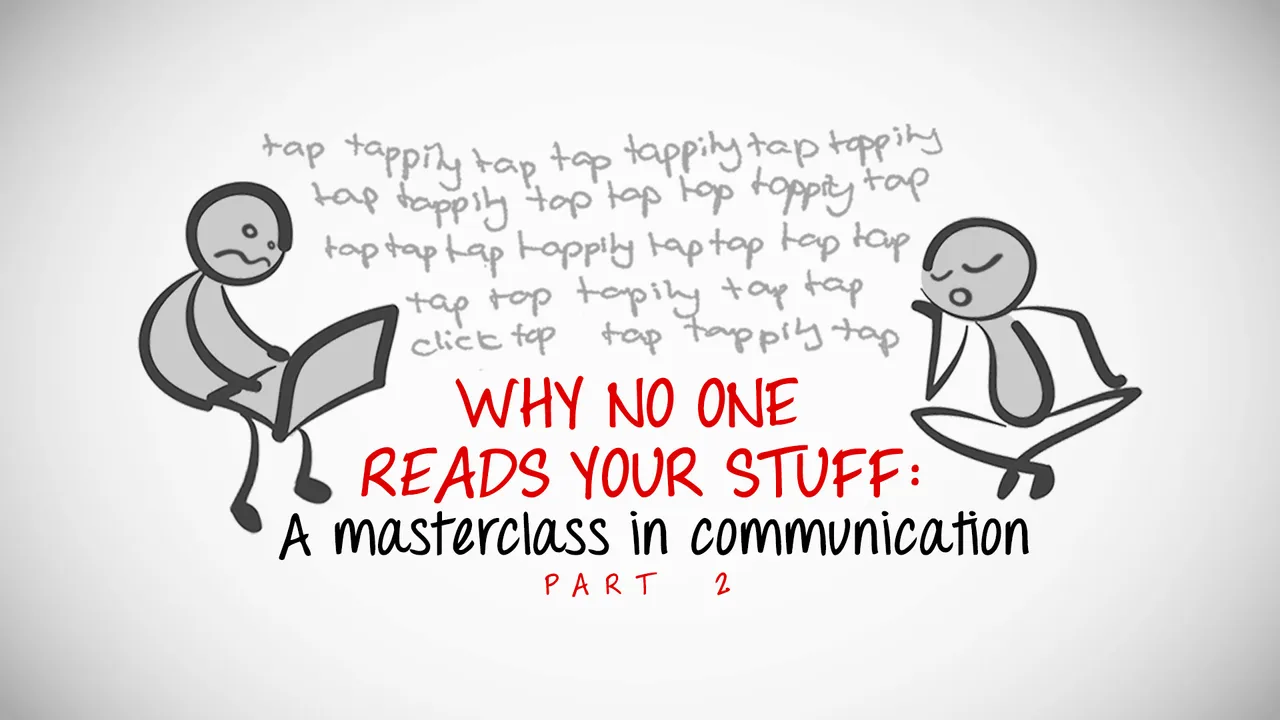CONTINUED FROM PART 1.
Part 1 left off with Emma excited to practice her new knowledge. We pick up there and then dig into the power of 'controversy.'
I was basking in the divine smell of bacon and eggs when my daughter-in-a-sundress flounced into our kitchen. Her triumphant smile told me she’d written something she was proud of.
“Daaad! I’m right on time for our lesson.”
“Well hello and good morning to you too, miss manners.”
“Sorry, I’m just excited, you’re gonna love what I wrote.”
“I will, but only if you communicate respect, appreciation, and common courtesy at the breakfast table instead of sending a message of a selfish desire to learn.”
“Oops, I’m saaawwweeee.” Em played up her youthfulness to take the edge off her ‘innocent’ mistake. She was a better communicator than she realized. Puppy-eyes like that’ll make her a demoness when her dating life picks up again. “Forgive me?”
“Tch. Fine, I appreciate your enthusiasm. Where did we leave off?”
“I believe we were talking about truth & controversy.”
“Ah, yes. Writing about controversial topics is great, but aim to tell the truth as best as you understand it. You may get it a bit wrong, but you’ll field questions easier if you were honest & understanding in your writing. So what did you write? Did you post it already?”
“I wrote ‘Why I Think God Is A Woman’, and no way, I’m not posting it until you’ve taught me all your secrets.”
“Wow. You really took ‘pull no punches’ literally, huh?”
“Like father, like daughter, n’est-ce pas?”
“Don’t be switching languages on me now, communication's hard enough in one. And anyway, I’ve never tackled divinity & gender-politics in a single post. You’ve outdone me, girl.”
She laughed and clapped. “Good! Will you read it? Is it good enough to post? Are there other writing tricks I can use?”
“Let’s see.” She passed me her phone and I began to read:
‘I’ve seen the face of God, and it was female. God is gentle. God is nurturing. God is radiant. God is beautiful. God is soothing. God is kind. God is loving. God champion’s peace, not war. God co-operates rather than competes. For these reasons and more, I believe God is a woman.’
Well, that’s certainly more bold, attention-grabbing, and compelling than your last post.”
“I know, right? It’s got more ‘energy’ in it than my old boring writing, and I could see it being valuable to a lot of readers.”
“You know this may get hate from all sorts of people, yes?”
“Sure, but no point in playing small and timid with my communication right? You said to treat it the same way I treat my photos, that way I’ll reach people.”
“Do you think it may perform better as “9 Reasons I Think God Is A Woman?” Why or why not?”
“Probably yes. Because people love numbers. Likely because they add certainty and clear, specific language. Readers know what to expect and they assume I’ll deliver, like most other posts titled with numbers.”
“Yes, adding numbers is an overused --but effective-- communication technique.
“Well, I’ll consider it. What did you think of the opening line? It got right to the heart of things, right? No fluff, no rambling!”
“It did, but it actually may ruin your whole post.”
“Why?”
“Because truth and understanding are so important, and your sentence appears either untrue, unprovable, or incomprehensible.”
“Hey!”
“Well, is it true that anyone’s seen the ‘face’ of God? Does God even have a face? Why would an omnipotent divinity need a face at all? Can you prove you saw it?”
“Geez, take it easy with the third degree. It’s poetic license. Besides, maybe I saw it in my dreams.”
“Emma, when you ‘offer’ a point to someone, it can either be a solid, firm, easy-to-grasp ball, or it can be like tossing them a ‘splash’ of water, impossible to grasp. Do you think your opening line is easy for most people to process, or do you think their minds will throw up multiple objections, questions, and concerns, just like I did?
“Probably they’ll think like you. Man, you really are psychic.”
“No, I just pay attention to how people think. Communicators all over the world do this all the time. They know that when discussing deep, philosophical concepts with little known about them, to avoid stating opinions as absolute truths. You’d run into similar issues talking about electricity, money, or ‘good and evil.’ These are things that most people consider ‘unknown’, ‘unsolved’, or ‘up for debate’, so claiming you know the truth about them isn’t just opening you up for haters, it’s sending the message that you know more than all of humanity. It can come off as arrogant, an exaggeration, uninformed, or anything in between.”
“Dang. I was pretty proud of that line. Energy, attention, and value.”
“A lot of people will see it as anti-value and bounce, is what I’m getting at. What if your opening line was something like: ‘TV shows use a booming male actor for the voice of God, but I say God is a woman’?”
“Ooh, that’s pretty good, and it avoids me claiming things that no one will believe at the same time.”
“Now you’re getting it. But you’ll probably still get downvoted way harder than you think.”
“Aww, how come? Did I do something wrong?”
“Not with your writing, it’s short, impactful, and maintains its value pretty well I’d say. It’s just that our current society gets pretty triggered by certain topics and ideas. God and gender-politics are both likely candidates for it.”
“But why? Ideas can’t hurt people.
They’re not weapons. They’re not painful. They’re just ideas. ‘This ball is red. The sky is purple. Genghis Khan had a cool name. The earth is flat.’ I can say any random idea I want and it literally harms no one. They’re just ‘things’ floating around in the ether.
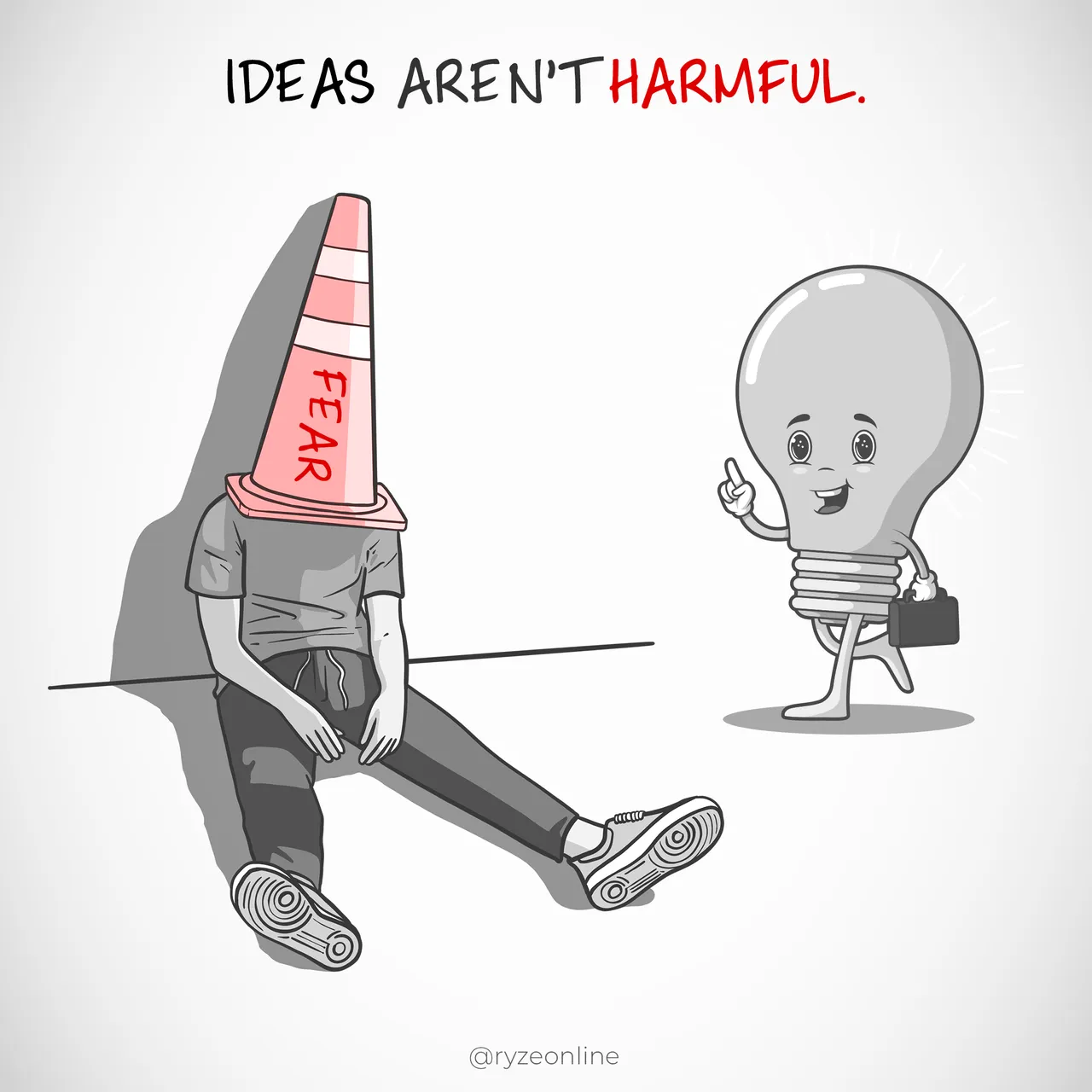
Sometimes people hoard ideas, sometimes they share them. The more ideas humanity has, the more valuable it is. The more options, the more freedom humanity has. If I want to propose the idea that ‘god is a woman,’ I should be able to without getting downvoted by spazmoids. You told me to speak my truth and communicate value, and I am! First social media censored my photos, and now my own father wants to censor my writing?”
“Whoa, whoa, easy girl. No one has censored your writing yet. Maybe Hive will love your post. I don’t know. I’m just saying that a people get defensive and take knee-jerk actions. They do things like downvote authors who make sweeping statements about these topics. They actually believe that ideas are harmful, scary, and something to defend against. Many also believe that being right is the holy grail, so they’ll never admit your idea is possibly better, and they’ll defend theirs to the death.”
“Or at least to the troll-thread and the doxxing.”
“I don’t know what that means, but… sure…”
“You’re so old.”
“And you’re so at a crossroads. You have a choice. Post your piece and see how people respond, or go back to the drawing board. If you choose the former, you’re a bold author, putting her work out and learning from feedback. If you choose the latter, you’re a bold author, willing to ‘kill her darlings’ and create better offerings. It’s the same as thinking before you speak, only it’s redrafting before you publish.”
“Grr. I don’t know. I was excited at first but now you made me nervous.”
“That’s because you care too much about avoiding downvotes. A ‘real’ communicator just speaks their truth as best as they know how, and soaks up the feedback, for better or worse. Do whatever feels best to you, the world won’t end regardless.”
“Alright, I'll edit in your opening line, then post it.”
“Great. Let me know how it goes.”
“Soooo… it was my highest-performing non-photo post on Hive ever. It got the most comments, most upvotes, and most reblogs. 719 upvotes.”
“Congrats!”
“Yeah, but you were right. It got the most downvotes ever too. 273 ‘broken hearts.’”
“Ah.”
“Yeah. I’m kind of in shock.”
“You’ll get used to it, just like you did with people labeling you ‘slut’ for showing a bit of skin in your photos.”
“You’re right. But there’s more.”
“Oh?”
“This dude, @rationalquibbler is like… picking a fight with me or something.”
“How so?”
“Well, he keeps commenting on my post with annoying little barbs and negative remarks.”
“Such as?”
“Well here, read this.” I took Emma’s proffered Hello Kitty-themed mobile device and read aloud:
‘Your point about TV is a strawman argument. There could be any number of reasons why you’re noticing male voices playing god. Maybe that’s just the type of shows you watch. Maybe way more men audition for the role. Maybe screenwriters aren’t looking to make a point about gender and are focused on other things…’
He goes on for quite a while here. Owch, and I’m the one who told you to put that line in, I almost feel like apologizing.”
“‘No apologies necessary Dad.’” Emma said, mimicking my voice.
“Touche. Well, he’s got a point. It was bad communication. But the point of it wasn’t to assess the TV industry’s portrayal of God, it was to be a jumping-off point for your perspective of God being a woman. It was merely a stage-setting contrast. And judging from other comments, many understood that, and read your post without pouncing all over this line.”
“Yeah, but this commenter picks on every word I write.”
“Ahem, let’s read more of mister @rationalquibbler:
‘How do you know god is gentle? Have you met him? Hmm? Maybe he’s committed, disciplined, focused, firm, and a total get-sh*t-done kind of guy!’
I see where this is going.” I rolled my eyes.
“See? What is his deal? Every comment of his just drains my energy. It feels like death by a thousand papercuts. What is he trying to do? Why is he investing so much time in calling out every other word I wrote? Doesn’t he have a life?”
“Probably not, hon. People like this think cold logic with minimal regard for the emotions, creations, or intentions of others is a high-quality way to live.”
“Why?”
“Who knows? Self-esteem, misunderstanding? Lots of reasons! You’d have to ask them. And it could easily be coming from a very positive place. Hyper-rational, logic-focused people often save us from bad decisions. They often make sure abusive laws don’t get put in place. Or ensure points are thought out and debated well. The thing is when you have a hammer (logic), every problem appears to be a nail (nitpicking.) Regardless, the main thing to know is that emotion lies in the ancient ‘reptile’ portion of our brain. It’s what kept humanity alive back in the cave-man days. It’s got way more years of refinement than our newer ‘logical’ brains.”
“So?”
“So even the biggest fans of logic make decisions emotionally, whether they realize it or not. Even the biggest happenings in politics, science, and law are founded in, and tinged by, emotion, intuition, and inspiration.”
“Then why can’t this guy feel the emotion behind my post and just let it go?”
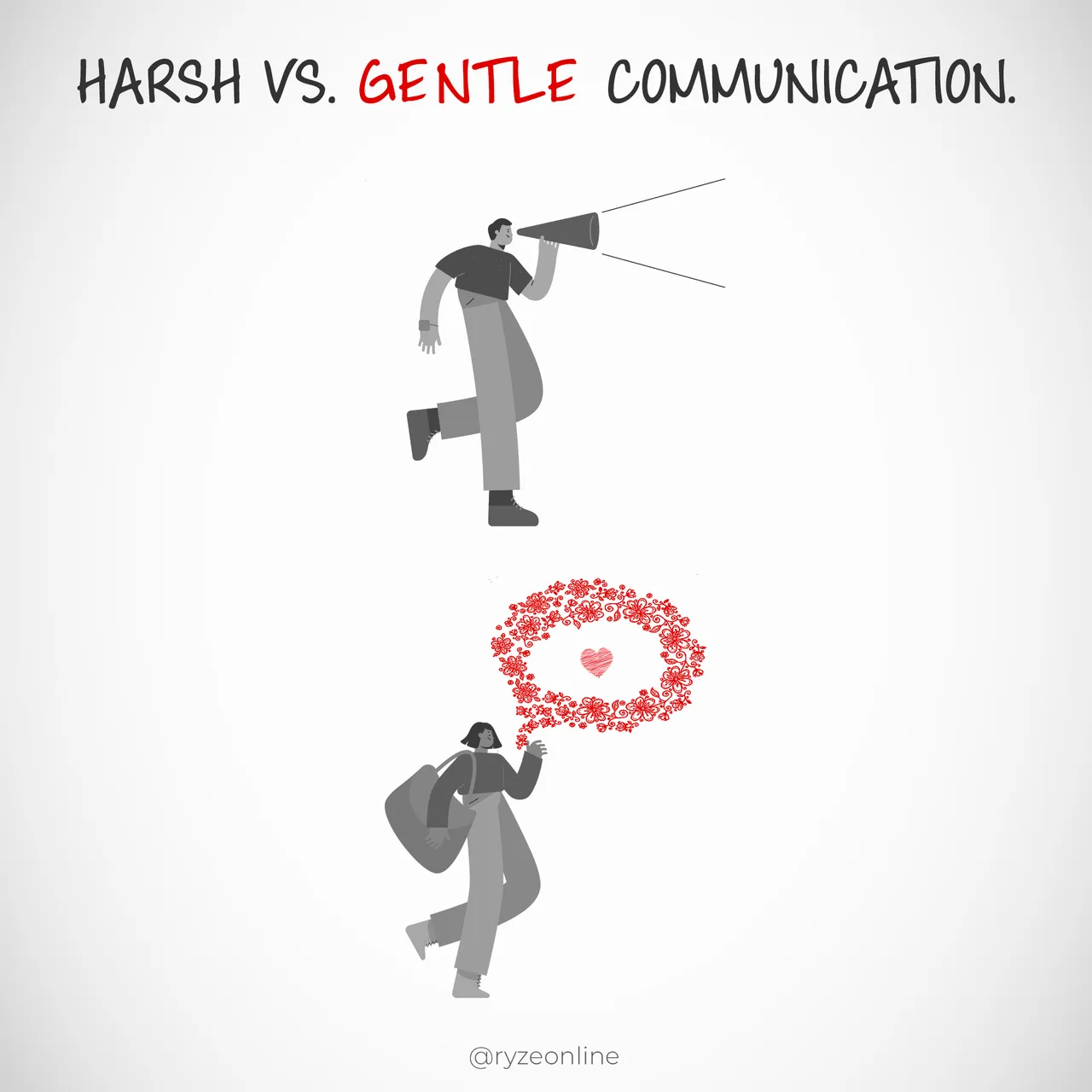
“Probably because he thinks ‘correcting everyone on earth,’ —unasked and unsolicited— is a good approach. Remember how I said everyone uses communication the best way they know how?”
“Yeah…”
“Well there’s plenty of people like @rationalquibbler who’s ‘best approach’ is to tear people apart on the ‘net. It’s a phase many people go through. They’re often very smart people, actually. They know logic, philosophy, and debate well. They can tear through most people’s arguments & make great lawyers, activists, and all kinds of awesome careers. They just know little about communicating with other humans during this phase. They don’t understand how to persuade people. They know only debate, argument, and conflict. They don’t understand the energy behind their words, and so they bring rough, harsh, self-righteous energy to whatever they say. They don’t understand value very well, so they believe the only valuable thing is nit-picking your points apart and making sure you’re ‘letter-perfect’ with what you type. If you’re not, they’ll let you know about it, and feel like a good person for doing so. They love to point fingers. They love to ‘look better’ or ‘smarter’ than others. They love to be right and criticize people they see as ‘less smart’ than themselves, all under the guise of ‘logic’ and ‘straightening people out.’”
“Ugh, I feel like less of a person just hearing about people like this. This literally drains society’s energy, you feel me? I pour my heart into my boldest writing ever and they don’t have one nice thing to say! Why even read my stuff then? Just click away and go watch porn or whatever. They’re basement-dwellers. It’s unreal. Why would anyone want to be around them?”
“Yikes. Em, careful. Don’t be so harsh, or you’ll end up like them. Use compassion. As you write more, you’ll get more commenters who will pick apart your words. If you judge every one of them you’re in for a rough life, and shouldn’t be a blogger. Judgment is a low-energy form of communication. It creates poor results. @rationalquibbler judges your writing, you respond by judging his current personality. Both of you become worse communicators every time you judge. And besides, you’re just like him.”
“WHAT?!”
“Well, probably not as often, but you sometimes behave similarly. For example, in the beginning of our chat, you were pointing fingers at readers, blaming them as if you were perfect, and entitled to upvotes. Just hearing it drained my energy, that’s why I wanted to leave… twice.”
“I think I’m gonna be sick.”
“Take a breath, my love. We’ve all been there.”
“Even you? You communicate so kindly, with so much understanding."
"Oh, I thought I was 'mean', remember?"
"C'mon, you know I didn't mean it. Seriously, you’re good at ‘reasoning’, like ‘Quibbler, but emotionally you're much more caring in your expression. You explain complex, challenging topics so gently and understandably. Even when you’re calling me out on my sh*t, you’re always really good about it. I find it hard to believe you’ve ‘been there.’ Come off it, Dad.”
“Nope it’s true. Ask your mother, she almost divorced me for it. And she would’ve been right to do so, I deserved it. Back then I was way worse than ‘Quibbler. I tore apart everyone’s words. I got a rush from being smarter than others. Dopamine hits from correcting people. I barged into any conversation I could just so I could lay the verbal smackdown. I’d blame everybody else, use my intellect to paint them into a corner, or make them look bad, or scratch at their wording. I couldn’t just say ‘hey, I see the point you’re trying to get at, even if it’s phrased a bit irrationally.’ I couldn’t just use my talents to offer better phrasing that'd strengthen their point. There are positive, kind, effective ways of correcting others, and there are petty, small-minded, self-righteous ways to do it. Guess which path I chose for years? I could’ve taken the time to gently see if others were open to correction. Instead I always chose to destroy and tear down their writings like it was my full-time job.”
“Wow. I don’t even know what to say.”
“Well it’s not like I’m proud of it. I don’t really talk about those days much, ya know.”
“How did you fix it?”
“Your Mom kicked me out of the house and I lived homeless for a while. It humbled me, taught me a lot about life, and totally revolutionized the way I think, the emotions I bring to situations, and my approach to communicating with others.”
“Err, I don’t think I can set up an elaborate life-lesson for ‘Quibbler.”
“Yeah. It’s rare that anyone can wake these people up. They’re convinced their approach is helpful and a good thing to do. Their phase will last a while until life wakes them out of it. Which means, you better get used to dealing with them. That’s the thing about mastering communication, once you get good at it, it can get a bit grating to deal with those who are less artful and productive in their expression. It also leaves you with the responsibility of handling the interaction, because they don’t have the awareness, skills, or practice to do it.”
“Well, since now I’m educated about commenters like this I can try and craft better posts that give them nothing to pick on. Or I can just ignore them as they rant into the interwebs.”
“Bingo. And it’s worth noting that he actually is offering value somewhere in there.
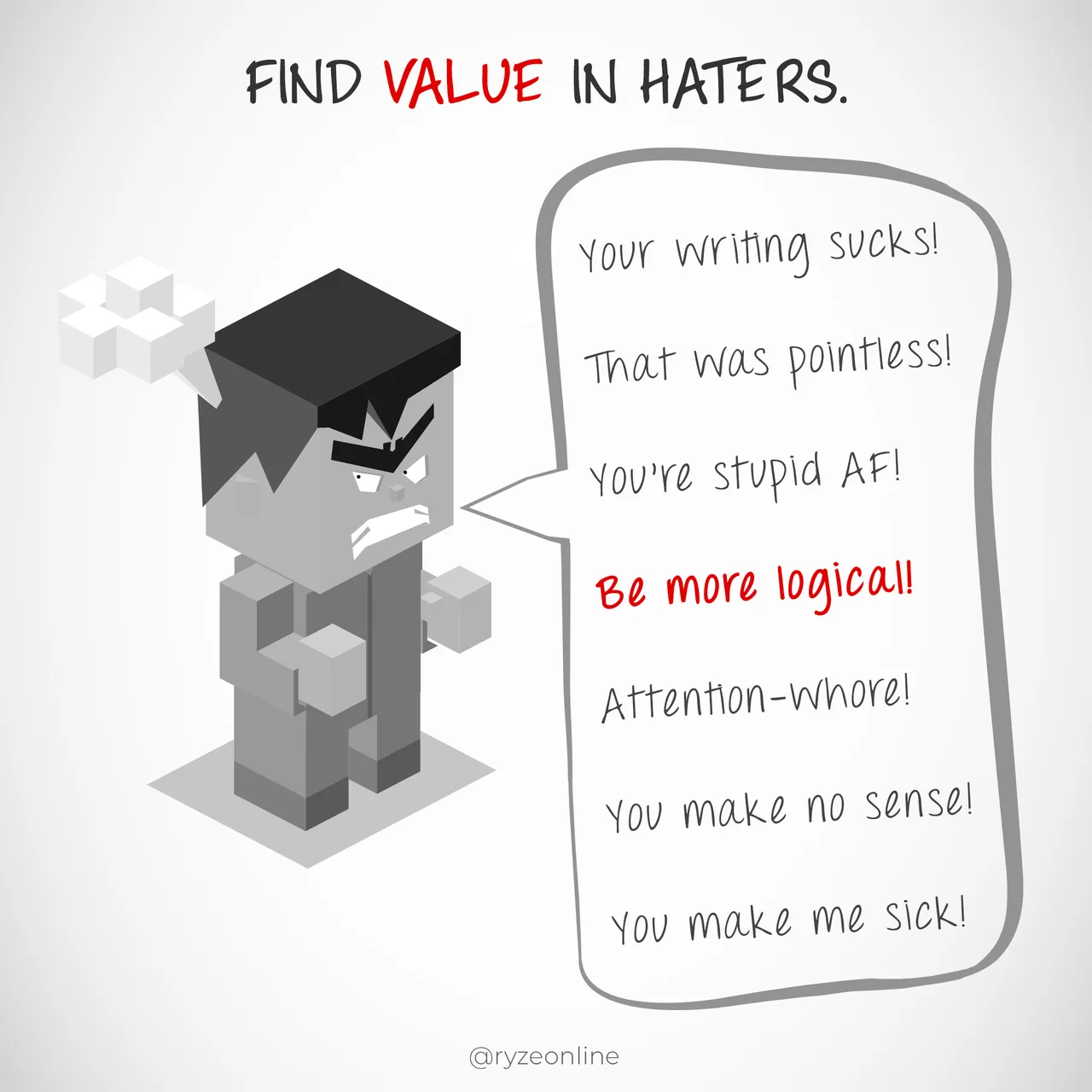
“And I’m supposed to wade through that bullsh*t?”
“Em, Being a good communicator isn’t just about persuading well, that's for the speaker’s side of things. It's also about being a good listener, taking feedback with an open-mind, and deciding if there's anything worth applying buried in an angry rant. It's about digging for the nugget of gold in the sh*tstorm that many poor communicators will deliver to you.”
“OK, well I’ll need to learn how to do this. I know I’ve asked a lot of you, but mind explaining this deeper?”
“Anything for you my darling daughter.”
“You’ve got to do what @rationalquibbler avoids. You’ve got to put yourself in other people’s shoes, avoid taking things personally, and see through the language to the spirit behind it.”
“The spirit behind his words is a giant ‘f**k you’ to every sentence in my post.”
“Don’t pout. You’re better than that. It’s kind of like how Olive barks at strangers. You can tell from Olive’s body language that she’s not really upset, it’s just an ‘empty bark'. And sometimes, even if she snarls and her tail stops wagging, we can still tell she means no harm to the newcomer, just from her ‘energy.’ The same thing goes for angry commenters a lot of the time. All bark, no bite, acting out of bad habits. Now let’s examine @rationalquibbler’s situation again.”
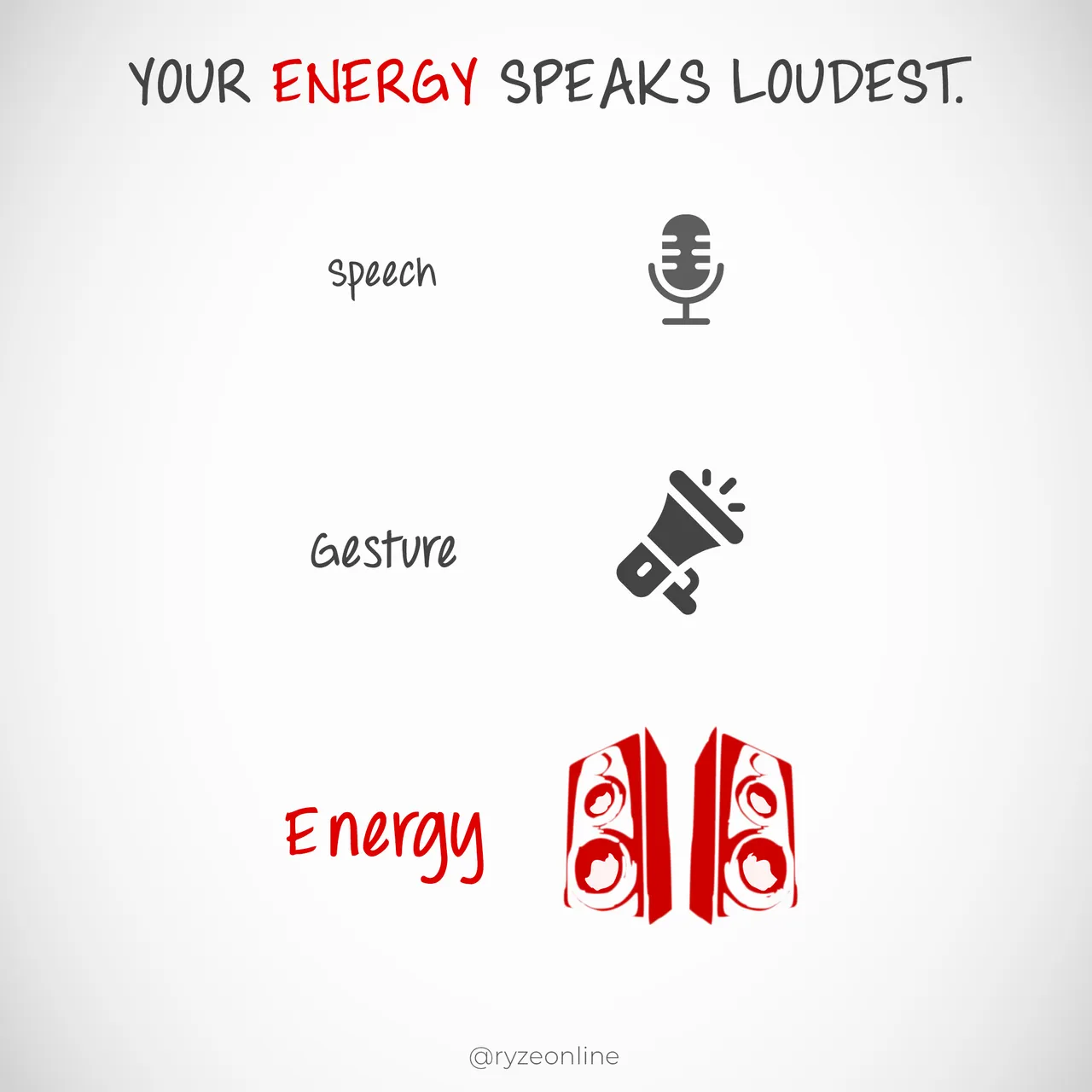
“Fine. he’s making sure my words are ‘logical’ or whatever, but that wasn’t the point of my post. It wasn’t an Einstein-level dissertation on the existence of God, it was a casual take on how ‘feminine’ traits seem pretty divine to me. Many readers understood that.”
“Right, but be honest… even when you’re communicating poetically, wouldn’t you like to make more sense? Wouldn't it be nice to satisfy any logic-focused readers who happen to swing by in the process? Wouldn’t you like more upvotes, less haters, and better comment-sections?”
“I mean, yeah, but--”
“No ‘buts,’ remember you said you’d accept my teachings in good faith rather than get all defensive. The question is, wouldn’t you like to have your sentences be on firmer ground, if possible?”
“OK, yes, I would.”
“And if we ignore all ‘Quibbler’s bad vibes, did he point out ways you could do so, if you wanted to?”
“Yes, he did.”
“So although he’s a pedantic, there’s still value in his feedback. He did try to elevate your reasoning, even if it was for a selfish dopamine rush. And if you addressed his objections with a better-written sentence, would it reduce these types of situations in the future?”
“Yeah, I guess.”
“Well there you have it, skillful listening. One where you don’t blame, snap, or defend, and instead use your creative mind to find value and use it to improve.”
“Well, I’m still telling my model-friends not to go near him.”
“Eh, sounds like you’d do it out of revenge. But even if not, this whole thing is a communication block for you. It’ll stop you from writing on bigger platforms and growing your audience.”
“What is?"
“Your need for validation, attention, and praise.”
“Excuse me?”
“Honey, I love you, but like most youngsters, you’re driven by external validation, and it prevents you from communicating as well as you could. You love commenters who upvote you, and hate ones who downvote you. You don't just take the good with the bad, so you can't learn from both feedbacks. What you’ve really been looking for since we began is a way to write words, click publish, and instantly earn crypto, you just haven’t come out and said that directly, because like I said at the start, you’ve been trained not to be honest in your communication. You’ve been trained to lie to yourself.”
“If I’ve been trained that way it’s thanks to you, Mom, and the abusive a$$hole we call my ‘bio-Dad.’”
After all the value I've given Emma, is she actually suggesting I've taught her poor communication on the same level as her convict 'real' dad? Unbelievable. I felt my temper rise. “Ohhh... and here I am speaking the truth again, and what do I get in response? I get hit with the full force of your 'blame cannons.'" My chin tilted downwards and my eyes narrowed. "Alright, little miss. You’re clearly trying to say that Mom and I raised you poorly. That we trained you to hide from your true motivations."
Emma stamped her foot but I was a mack truck, barreling down the road.
"For some reason I can be completely honest about why I was nearly divorced and my past as a d*ckhead, but I left out my terrible parenting. You have caught-ed me. Me, your Mom, and you bio-dad are responsible for you validation-seeking. Whatever you say.”
“ARGH! You’re impossible!”
Emma peeled out of the house and slammed the door.
For someone who’s so high-and-mighty about his communication skills, it’s possible I mis-timed that particular lesson. Would Em come back? Would she ever listen to my advice again? Would she hate me forever?
Oops.
My wife Maria said Emma would get over it, but I wasn’t so sure. Em called her mother, from Mia’s house and said she was staying there. I pointed out that Em had never stormed out mid-conversation like that. Maria replied she probably learned it from me. Oh well. Communication by example, I guess.
I didn’t see Em for three days, when she quietly knocked on the door to my den. I closed my League Of Legends game and swiveled my chair to face her.
“Em, look, I never meant to upset you--”
“Dad, let me talk first please, ok?” I nodded. “When I got to Mia’s I so furious I was gonna run away. I complained nonstop to Mia. I told her how you were an arrogant prick who thought he could tell me what I do and why I do it. I told her how you spent two days getting philosophical about writing and didn’t teach me what you promised. I told her you just love hearing the sound of your own voice.”
“Uhhh, and why am I letting you say all this?”
“Wait, I’m getting to it. I was ranting until Mia interrupted me. She said ‘Em, didn’t your Dad help you when your photos got banned? And wasn’t he the one who helped you join Hive in the first place? And wasn’t he right about Dylan treating you badly? And didn’t he step up and care for you when your bio-Dad went to prison? So why are you so jazzed up about this one thing he said?’ And it got me thinking.”
“Thinking of murdering me in my sleep?”
“No! That’s terrible, shush. I wondered why I was reacting so badly. I handled it worse than I did @rationalquibbler. That’s a messed up way to treat someone who’s been so good to me for years. And you were just trying to help. And you thought I was mature enough to hear the truth, so you told it to me.”
“Thank you so much for saying that, Em.”
“And I realized I was reacting that way because you were pretty close to the truth. I do want external validation, in fact, I was attached to it. I wasn’t writing ‘for my audience’, I was writing to see the little number go up. And I’d been lying to myself for so long about it, that having it lit up by you, was like shining a spotlight on the boogie-man. I’m sorry, and thank you for having the guts to tell me what no one else would.”
We embraced, and it felt like the entire universe was hugging me.
“Wow, Em, this is some impressive self-awareness, but I’m still sorry for how I handled it. I talked so long about how to gently communicate in ways that resonate, and then I didn’t do it with you.”
“Maybe, but I don’t think the world’s best expressor could’ve pointed this out to me without getting a harsh reaction.”
“Well, that brings us to another ‘big gun’ of communication that people neglect, and it’s one I should’ve used more with you.”
Emma squealed with glee. “Oh em gee! Are we continuing the lessons? What’s the big gun?”
“Questions.”
“Questions? Puh-leeze.”
“Yes, but thoughtful ones. Most people overuse the ‘how’ question. They also underuse ‘why?’ For example, instead of just pointing out your boogie-man, I could’ve said ‘Emma, your heroes in interviews say they never did it for money or fame. And they seem very sincere. Why do you think you’re so focused on upvotes?’”
“That’s actually a really good question. And it would’ve stopped me biting your head off too.”
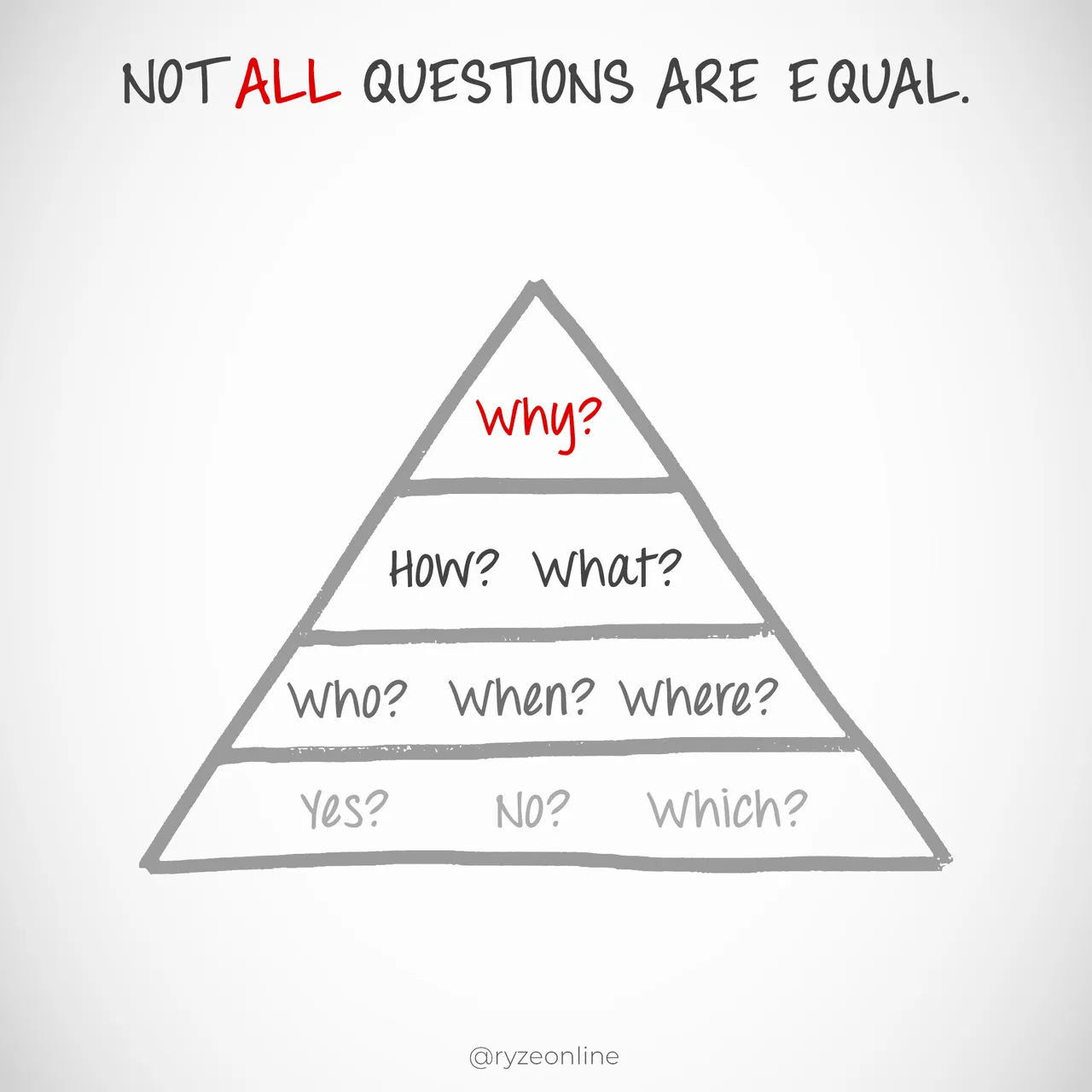
“Why is probably my favorite question.”
“Why?”
“See?”
“You’re a laugh-riot, Dad. But seriously, explain please.”
“Sure. Questions like ‘how’ are functional, but a question like ‘why’ is inspirational. Like there’s a world of difference between the two.”
“I can see that. ‘Why do random acts of kindness matter’ is a lot more inspiring than ‘How do I do a random act of kindness.’”
“Spot on. Also, asking ‘why’ clears up confusion.”
“Hmm. I get that too. ‘@rationalquibbler could’ve just asked me why I wrote what I did, instead of snapping to judgment, and we could’ve avoided all the messy drama.’”
“Well said. Thirdly, asking ‘why’ adds purpose to your pursuits, and positions you to win more.”
“I believe it. It's OK to ask 'what' people's needs are, or 'who' is involved. But the best communicators I've seen start with 'why' instead, provoking people to think.”
“Great job, Em. Sounds like you get 'why.' I’ll add that it challenges us to constructively question assumptions.
“Just like you’ve done to me over the past while. Wow. Maybe I can use questions to diffuse the ‘Quibbler!”
“Hah, could work, but I’d advise disengaging from him, ‘cause he’ll keep going until he has the last word. He’ll suck you into a chain of debate that isn’t worth your time, and certainly won’t add to the earth’s overall joy-levels. But if you want to be a top-tier communicator, let your last message to him be gratitude. Thank him for commenting, for asking ‘rational’ questions, and for ‘making you think’ about your writing. He’ll be shocked, because he’s so used to everyone fighting his pedantic antics and semantics.” I laughed at my own joke.
Emma rolled her head back and her eyes way up, then sighed. “You were saving that one up weren’t you.”
“You know it!” What can I say? Wordplay is so enter-tay-ning to me. Maybe it’s a ‘communicator’ thing? “Anyway, we should probably go over ‘questions’ and ‘gratitude.’ Both will elevate your writing results.”
“If you think questions and gratitude would’ve gotten me more upvotes than-- actually, I don’t care about upvotes, I care about my audience. And if you think it will add value to my audience, I’m in.”
“Heh, good catch. Questions create engagement. They engage your reader’s minds. They get them doing the mental work that a receiver is meant to be doing, instead of autopiloting through your words. They plant seeds that blossom. They penetrate to people’s core where blunt statements will often bounce off.”
“A quick example?”
“Well, your bold post the other day might have been better if you ended it with a question, something like ‘What role does God play in your choices in life?’ Don’t you think that would’ve sparked more engagement and made people feel more included in the conversation?”
“Hey, I got plenty of comments, people were not shy.”
“Sure, but did you miss commenters, simply because there was no question inviting them to do so? Questions are like a giant red carpet. They send the message that you care about the reader, and invite them to walk the carpet and join the convo.”
“Shoot, good point. I’m pretty sure a question would’ve helped.”
“Yep, next time try it and see. Next up, gratitude.
Humanity loves gratitude, gratitude gets attention.
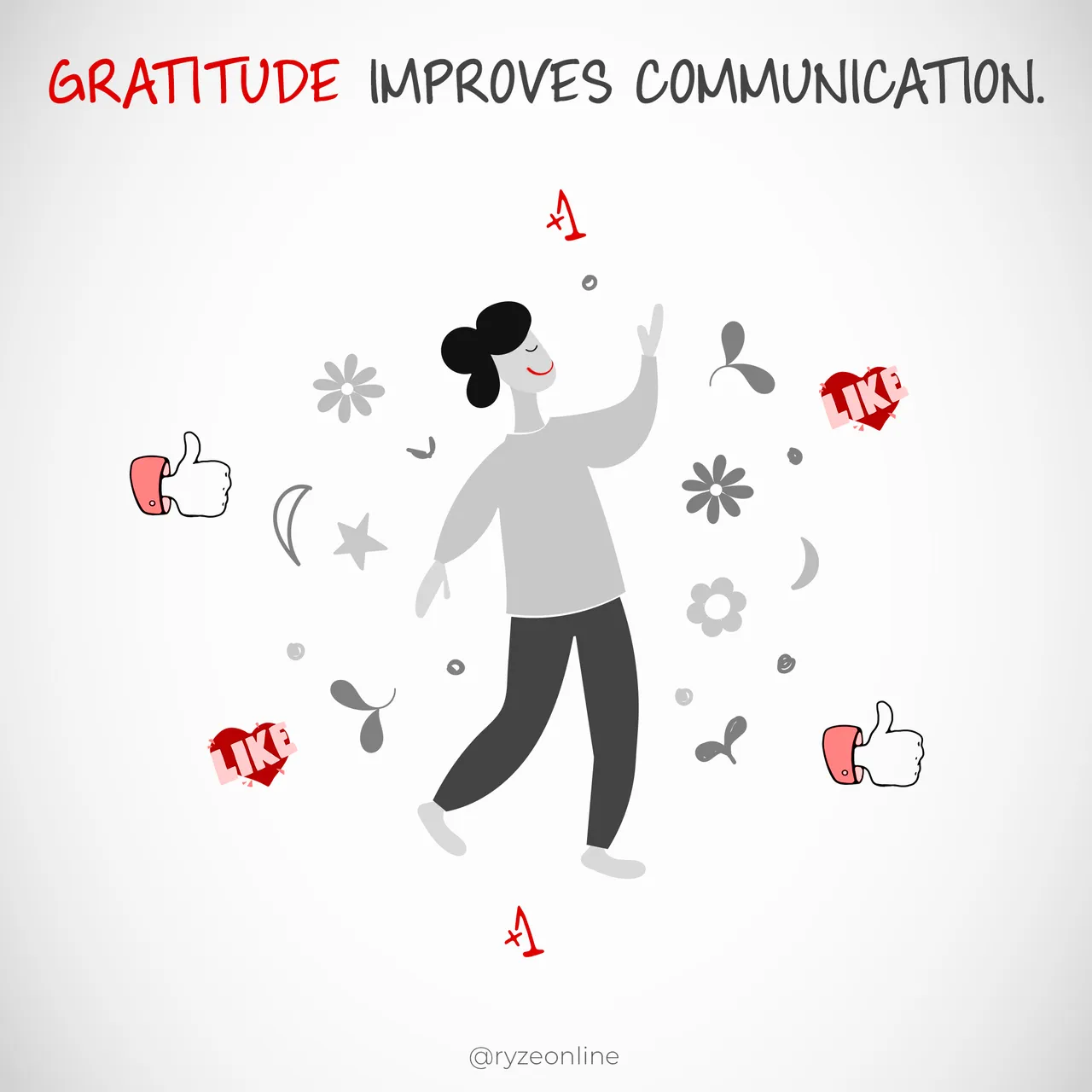
Which post gets more eyeballs on it, the post where you write your opinion and thank nobody? Or the one where you opine, then add art and tag the artist? Plus you dedicate the post to a few people who inspired it, and tag them too. On top of that, mid-post you quote some brilliant lines from others, and tag them as well. All told you have 10-12 honest, sincere, thankful tags. You’re showing love to those people. Giving them public credit. Which version of the post is going to perform better?”
“The second one. K, I get it. Questions and gratitude in my posts if possible, find the value in negative feedback, and write mainly for the audience not for external validation. I think I’m ready to write my next post.”
“Awesome, Em, I’m excited for you. Do you know what the topic is going to be?”
“You’ll see.”
‘Crypto Is A Bubble, And It’s Already Popping’
Do you remember Pets.com? Webvan.com? Go.com? Do you remember the dot-comedy of errors that was the early world wide web? Everyone and their dog was starting a web-company, and thousands, maybe millions of them went belly-up, taking their investors with them. The same thing is happening with crypto. Pretty soon kids, autists, and seniors will all have their own sh*tcoins, destined to fail--’
My jaw dropped open and I instantly stopped reading Emma’s post.
I couldn’t believe she had written this, let alone published it.
“Oh my god, Em. What did I tell you about throwing around labels and putting people in boxes? I can’t believe you posted this without letting me proofread it. You’re not just going to get destroyed in the comments, you’re going to get canceled.”
“Um, yeah. I was focused on the newer lessons, I may have forgotten. On the bright side, it went viral. Only problem is, a lot of people hate me. I thought it might just bother crypto investors, but a twitter user named @SJWoker screenshotted it and linked it in her giant rant. I cried at first but remembered what you said about feedback, so that’s something, right?”
“I’m speechless. What were you thinking?”
“Nothing bad! I just wanted to make the point that altcoins are popping up everywhere just like dot-coms used to, so much so that ‘everybody and their dog’ will have one, but I already used that line, so I dunno, I just listed groups of people that seemed unlikely to start their own coins. It made sense when I wrote it. Looking at it now, I can see how it just opens the door for people to get mad at me.
She called it ‘able-ist language, whatever that means.”
“It's basically prejudice against the differently-abled, usually with the attitude that 'typical' abilities are 'better.' So if you suggest that someone on the spectrum is unlikely to start their own cryptocurrency whereas a 'normal' person is more likely to do so, it could be seen as ableism.”
“Even after all your tips, it feels like my communication’s worse than ever.”
“Hey, hey, don’t be so hard on yourself. At least you’re practicing & taking risks. This is how you get better and learn to surf the wave of publishing in public. Most are too timid to do any of this stuff. And if you look at your post objectively, it’s better. You replaced your ‘unprovable’ hot-button topic of ‘God’ with a more specific, niche topic of crypto. You opened with engaging questions that resonate with your audience. You used all the techniques I taught you and even some we haven’t talked about.”
“I did?"
"Yep, you have hints of storytelling in there! Storytelling can move mountains. It can turn stuff people wouldn't normally pay attention to, into a riveting read. It can slip ideas past defensive mental armor. Plus stories are more shareable than most other content.”
“Oh, well, yeah. That? Totally intentional. For sure. I definitely-totally-consciously aimed to add storytelling. Yep. That's me. In no way was that an accident.” Emma babbled with over-the-top cheerfulness.
“And look, your sarcasm is still on point too.”
Emma grinned. “Maybe we’ll talk about storytelling more, but I really don’t understand what was wrong with my sentence.”
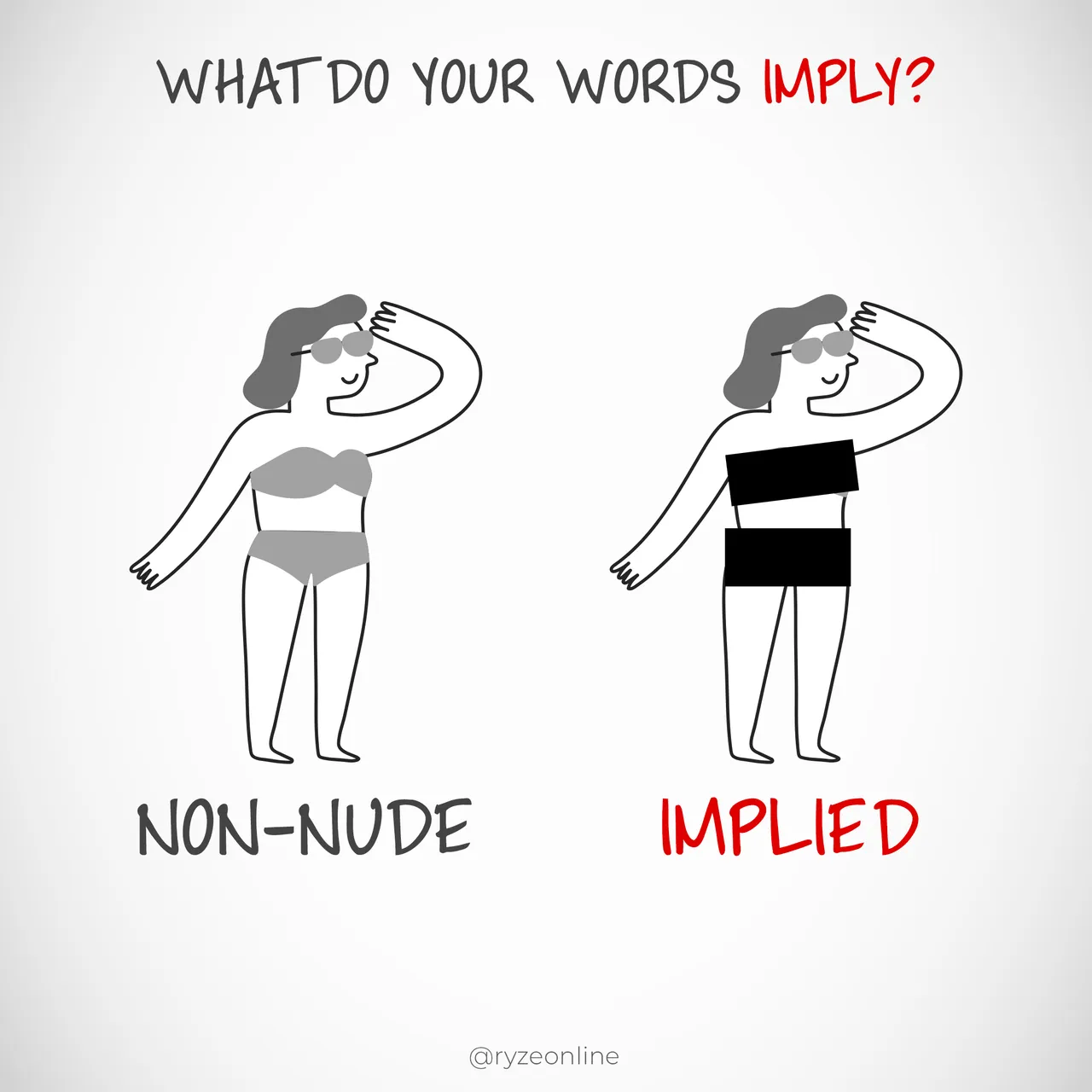
“Well, the main issue here is ‘implications.’ Your lines may seem fine. They may make sense to you. But if you don’t think through their ‘implications’, it may get taken the wrong way. For example, if I say ‘Emma is actually writing better than a 6-year old now!’ are you offended?”
“Uh, yes!? What the hell. Are you implying that I used to write worse than one?”
“See? Implications. Technically my statement is correct."
"Yeah, if you're a jerk."
"Relax. Technically, you are writing better than a 6-year old now. And back when you were three, you did not. Just like you, my line ‘made sense in my head’, but guess what? Because I didn’t think through the implications, or how you might take it, I ended up upsetting you, perhaps even turning you into an enemy.”
“And that’s what I did with that line?”
“Yep, it’s something many authors do. Some out of ignorance, and others intentionally to create controversy, and even... virality.”
“Hmmm. OK, thank you, I get it.”
“Do you know how to fix a bad implication?”
“No.”
“Well, when you communicate something, and it gets challenged you can either ‘stand firm’ on it, and ‘double-down’ on defending it. This means you don’t change the sentence, and you stand by your reasons for expressing in the way you did.”
“Or?”
“Or you apologize. You don’t defend your sentence, you don’t give solid reasons for why you wrote it, you simply own your mistake and let people know that your communication isn’t perfect, that you learned a lot, and that you’ll do better in the future. You may even re-write the line with an edit, and give credit to @SJWoker for bringing the issue to light.”
“Ugh, she was so mean. Like even worse than @rationalquibbler . But I remember what you taught me. Take feedback well, be as grateful as possible, and find the value in it. And I learned about the power of implication thanks to her.”
“What am I, chopped liver?”
“OK, fine, thanks to you too. Want me to tag you in my apology too?”
“Hush you.”
“Alright, I better go fix this.”
I was on the porch sipping lemonade when Emma rejoined me. She stood there with her hands behind her back, eyes gently downcast.
“Would you like some Lemonade?”
“Yes please. I’d also like you to read my apology before I post it.”
“Nice to see you recognizing…
...The power of ‘fresh eyes’ and redrafting before your post.”
“Yeah, lesson learned there. Here’s my post, I wrote it after studying non-violent communication by Marshall Rosenberg.”
“My, my, you’re turning up. Really taking your writing seriously if you’re actually bothering to do research and not just ask dear old Dad.” I gave Emma an over-the-top grin to show I wasn’t really criticizing.
“Thank you.”
“If you really want to dig deep you can explore Plato’s philosophy on language & symbols, or Wittgenstein’s ‘Philosophical Investigations', or ‘The Language Instinct’ by Steven Pinker if you want a more modern take. They’re not perfect, but you can learn a lot from them and begin forming your own ideas. But anyway, let me read your new piece.’
‘I Insulted People On The Spectrum, Please Don’t Be Like Me.
Have you ever mis-spoke? There are people who when they mis-speak, defend their errors. They justify. They shirk responsibility. They double-down on their faux pas. They simply refuse to admit they were wrong in any way. And I was one of them. When we speak, we often have the chance for fast corrections, but when we write something and hit publish, we may not be able to clarify a poor statement before many have started berating us for it. I love people, and in trying to express my views about crypto, I mis-spoke, and implied some not-nice things about certain groups of people. And I got raked over the coals for it by @SJWoker , and I totally deserved it. This is my apology to her, and to anyone and everyone who felt slighted by what I wrote. I hope it doesn’t make you think less of me, but I understand if that’s your take. I hope it doesn’t detract from the point I was making, but I understand if that’s the case. The world could use more kind, loving communication, and it’s my intention to contribute to that as best as I can. Sincerely, Em.’
“Wow. Really beautiful self-expression Em.”
“Do you think it will fix things?”
“Like with all communication, all you can do is do your best, experiment, and see the feedback. But yes, I do. It’d be weird if people didn’t soften up their knee-jerk, cancel-culture ways after an honest message like that. This kind of thing shows you’re gaining mastery over the energy, value, and attention in your writing. And a side bonus, you’ve learned something many communicators never learn.”
“Well now I feel special. What did I learn?”
“The power of ‘working with the negatives.’”
“Uh, this makes me never want to touch a negative ever again.”
“Now, now, you know it got you major results.”
“Fair point, but there must be a better way to do this.”
“There is. Dealing with negatives, pain, and controversy in your writing is like playing with fire. It can unlock amazing new discoveries and results, but you can also get burned. This is why a lot of ‘nice’ people simply refuse to work with them. They think they’ll somehow hurt others. What is a more compelling headline? ‘I Totally Understand Cheaters, And You Should Too’ or ‘All Healthy Relationship Models Have A Place’?”
“Many self-proclaimed ‘spiritual’ people have ideas in their head that they label as ‘negative.’ They refuse to use them. They're scared to say things like ‘I Don’t Think Charity Is The Solution’ or they run in terror at words like ‘Genius’ or ‘Slut’, or they think if they ever cuss, they’ll lose their entire audience forever. They won’t work with things they consider ‘negatives’ and refuse to write about ‘uncomfortable truths.’ And it’s a shame really, because they’re basically cutting out the ability to resonate with people who are in dark places, limiting their audience massively. Human beings have frustrations. They will seek help for those frustrations, as long as those frustrations are spoken to clearly. If a plumber refuses to talk about clogged pipes, he may have trouble getting customers. If an author refuses to talk about the elephant in the room, he may have trouble getting attention. Not to mention that it’s very hard to take a reader on a thrilling, fulfilling emotional journey if they start way up at bliss. If everything is happy, happy, joy, joy at the start of your story and it only goes up from there, it’s not a lot of room to play.”
“There’s a line in a Drake song I’ve always loved but I’m understanding it on a deeper level now.”
“What is it?”
”She asked what have I learned since getting richer / I learned workin' with the negatives could make for better pictures”
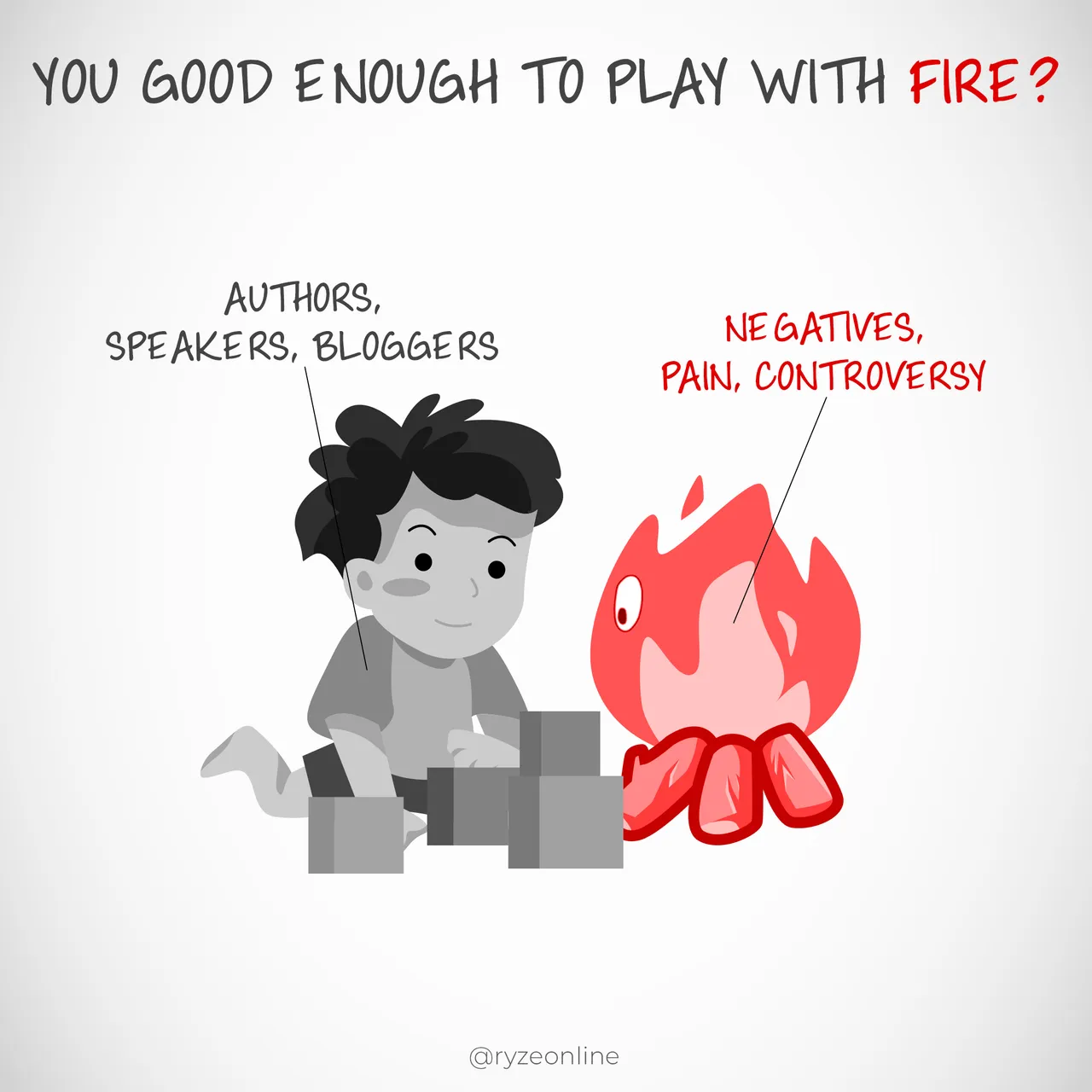
“Wise words. And overlooked by many. The idea is to ‘offend with purpose’ or ‘stir emotions in order to help.’ Many authors do this well, it just takes nuance and finesse. So how do you feel about some of your ‘negative’ writings now?”
“Well then I’m kind of glad they happened. They got me more comfortable with people getting triggered. They taught me to really pay attention to every sentence. They gave me practice at fixing things if my writing goes too far. Plus it got me thinking about…
...The way kids communicate, or those who’re non-verbal.
Some of them struggle to communicate or get their point across in ways that others can grasp. Do you think you could teach them all this stuff too, I bet it’d be really helpful.”
“Well, it’d be a different teaching and learning experience, but yes, I’d say so. All of them can understand energy, attention, and value, because these are very primal things. They’re instinctually and intuitively realized. Even animals know how to use their energy and attention to create value. They know how to move towards their highest potential, whether they do it effectively or not. I firmly believe anyone can improve in communication, if they apply themselves, often at a pace that surprises even themselves. Anyway, I’m more psyched about your mature, calm approach to communication. Very impressive!”
“Thanks Dad. And honestly, these last few posts have had more engagement than I’ve ever had on my writing, even if it was more hate than I’d prefer.”
“Exactly, as you improve at communication, your results improve too.”
“Makes sense. So I have a new question.”
“Shoot.”
“Are there tricks and tips I should be using in my writing that I’m not? I signed up to the copywriting subreddit, and they’re full of X Tips To Convert and stuff.”
“Well, talented copywriters are wonderful to study. And yes…
...Copywriters often have clear, practical tips that help.”
“Such as?”
“Well, like I said before, storytelling. If you want to learn that, I’d check out Storynomics by Robert McKee. And copywriters use something they call ‘The Big Idea’, to learn about that, find an old Lecture To Philips Publishing by Eugene Schwartz. You can try structuring your writing according to the 16-Word Letter by Evaldo Albuquerque. They also use ‘juicy’, emotional language. They’ll use ‘Show Don’t Tell’, ‘Action Verbs’, ‘The Magic Square’, and more.”
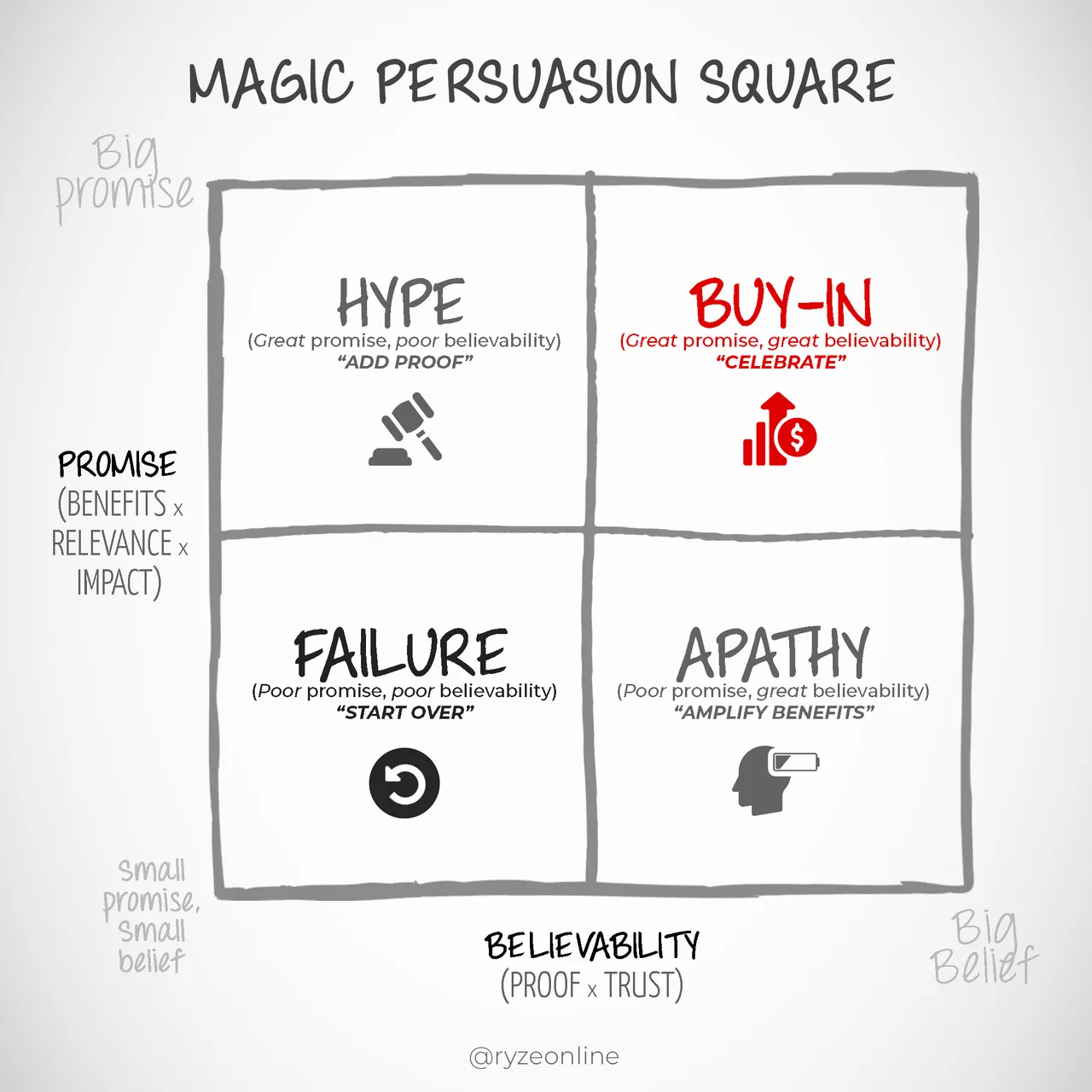
“Holy! I can’t learn all that!”
“Yeah, that’s why I didn’t get into all of it. Firstly, it’s stuff you can easily google, and secondly, none of them will work if your communication beliefs aren’t properly aligned. You need the fundamentals.”
“Whew, ok. Good to know.”
“There is one thing from copywriting you’re going to want to use if you’re still interested in upvotes though.”
“What’s that?”
“A ‘Call-To-Action.’”
“A what?”
“It’s nothing too crazy, and it’s not exclusive to copywriting, they’re just the people who’ll talk about it the most. Have you ever watched the old campy Batman TV show from the 60s?”
“Yeah, but only ironically.”
“Well that show is a giant piece of ‘communication’ to their audience, right? And at the end, they always make sure to say ‘Tune In Next Time! Same Bat-Time, Same Bat-Channel.’ That’s a call to action.”
“You want me to have a lame catch-phrase in my post?”
“Not at all, just write a suggestion of what action readers may want to take next. Maybe something like: ‘If you feel I shed a little light on women and god, please upvote this,’ or ‘The world needs to see more honest apologies, please share this article,’ or any other action you want to suggest. If you’ve given decent value in your communication, people will often be ready to reciprocate, but only if you provide a clear path for reciprocation.”
“Ohhh, so inviting them to do something at the end of my post is a big part of getting upvotes! Er, not that I care about those anymore.”
I chuckled. “Yes, you’ve got it.”
“Great, I’m going to write one more piece for practice. Is there anything you think I should study on my own before I do?”
“Hmmm… very good question. A good writer reads a lot and writes a lot, just like a good teacher learns a lot and teaches a lot.”
“OK Dad, you’re a ‘good teacher’, geez, fish for compliments much?”
“Hey, just noting something many neglect. A good creator creates a lot and consumes a lot. There’s two sides to all communication, and you’ll be terrible at it if you don’t have both side’s perspectives.”
“Ahem… book-recommendations please?”
“Ah, yes. I’d study anything on ‘writing voice & personality.’ I’d study ‘plot twists & suspense.’ I’d study ‘niches’ and ‘audience rapport.’ And I’d probably read ‘Writing For Emotional Impact’ by Karl Iglesias along with ‘Breaking Through The Noise' by Tim Staples or even 'Hey Whipple, Squeeze This' by Luke Sullivan. But honestly, once you have good fundamentals of energy, attention, and value covered, you’ve got enough to go on. Writing is a journey and it’s not about learning everything from me all at once. It’s not about reading every book under the sun.”
“Oh I know, I get it. I’ll just pick one of them and explore a bit, but I wanted to email a list to myself just so I’d be ‘stocked up’ on materials that may help down the road.”
“Smart girl. Good luck with your new piece!”
“Thank you.”
Emma found me in my den once more, this time fortunately, I wasn’t in the middle of a game. I was just reading and sipping some home-made chai Maria had made.
“So Dad, I thought about everything you said, and put together this post about my fight with Cassie a couple weeks ago. Mind proofing it?”
“Sure, but you really should get proofreaders from your target audience, not ‘Professor Dad’ over here.”
“Oh I will, I just wanted your input first.”
“Alright, let’s do this.”
‘Why My Sister Went Nuclear Over A Blouse
Who turns violent because they can’t borrow a top? My sister Cassie does. Now, I’m not going to paint her in a bad light, because this whole situation was entirely my fault. I know better than to push her buttons. You see, conversation is like ‘word-tennis.’ Or more like two tennis partners practicing to keep a rally going. The object isn’t to dominate an opponent, it's to lob nice shots over the net, within reach of your practice partner. That way each person can contribute to good ‘conversational momentum.’ But I didn’t do that. I was short, sharp, and cruel to Cassie. The energy behind my words was spiteful, not loving. I was in a bad mood after dealing with my ex earlier in the day, and I took it out on her.
It started with me interrupting her too much, and in the wrong way. Interrupting to prevent someone from going down a dark path that benefits no one is great. Interrupting so that a person can’t express their honest feelings in a safe space, isn’t. Plus I was just mean.
If we were on a tennis court, every shot I made would’ve been out of bounds. Cassie did what anyone would do. At first she tried to play fair. She wanted my blouse, so she didn’t instantly become sarcastic with me, instead she was kind with her words. But her body language was giving me clear signs that she wasn’t finding value in what I was saying. I noticed it, it’s pretty obvious when someone turns their body towards the door. It’s easy to see when her shoulders rise up to her neck.
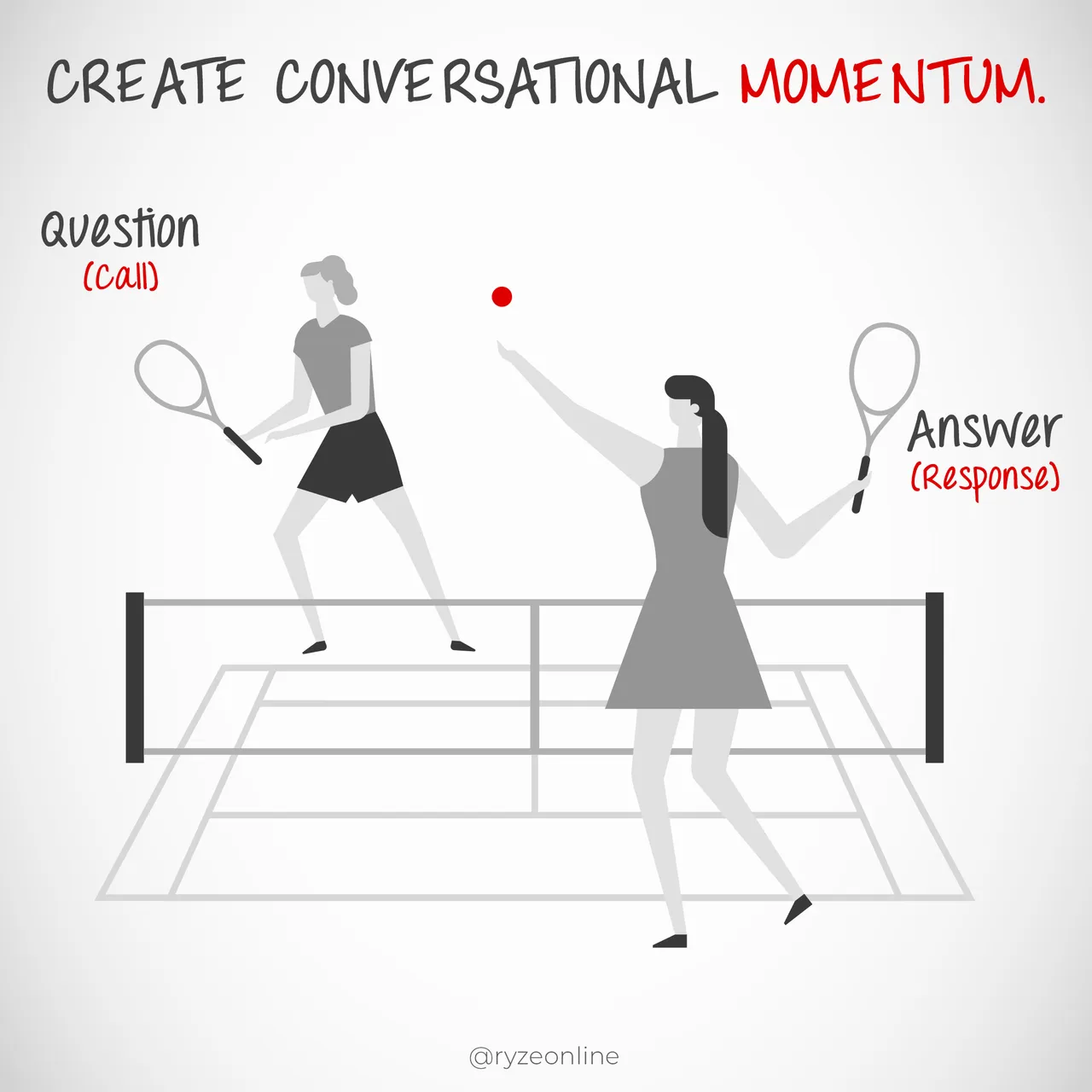
But I ignored the signs and kept hammering her with verbal abuse. I criticized her looks, her approach, and our history together. I threw everything in her face. And what do you think happened to our convo? The word-rally broke down. Cassie eventually snapped. She went nuclear. She let me have it, but good, and even started throwing things at me. (Sidenote: heels in the wrong hands are literally deadly weapons.) Eventually she stormed off and I was left alone in my room. I still had my top, but I’d lost my sister. And as I sat there in the silence, I realized something.
Good communication requires a good heart. Words are expressions of ideas and emotions. They start in our minds. So if we see our words having a poor effect, there’s a high chance that one or both communicators involved have personal issues deep inside. Ones that are being reflected in their conversation. I’d been getting cocky with all the things I’d been learning about communication, and I didn’t realize I’d been judging my sister and myself for a long time. I didn’t realize I had issues with abundance and sharing. I didn’t realize I was actually jealous of my sister’s body-shape. And all these issues bled out into my communication with her.
I always considered myself at an ‘8 out of 10’ at emotional maturity. I considered myself an ‘8 out of 10’ at communication. But like Dad said, many of us are trained since birth to lie to ourselves and to lie in our communications in order to look good and get what we want. I considered myself ‘better’ than Cassie, and that ‘superiority’ turned ugly, fast. Good communication requires good self-assessment, not painting a happy face on all my less-than-positive qualities.
This realization was a real gut-punch.
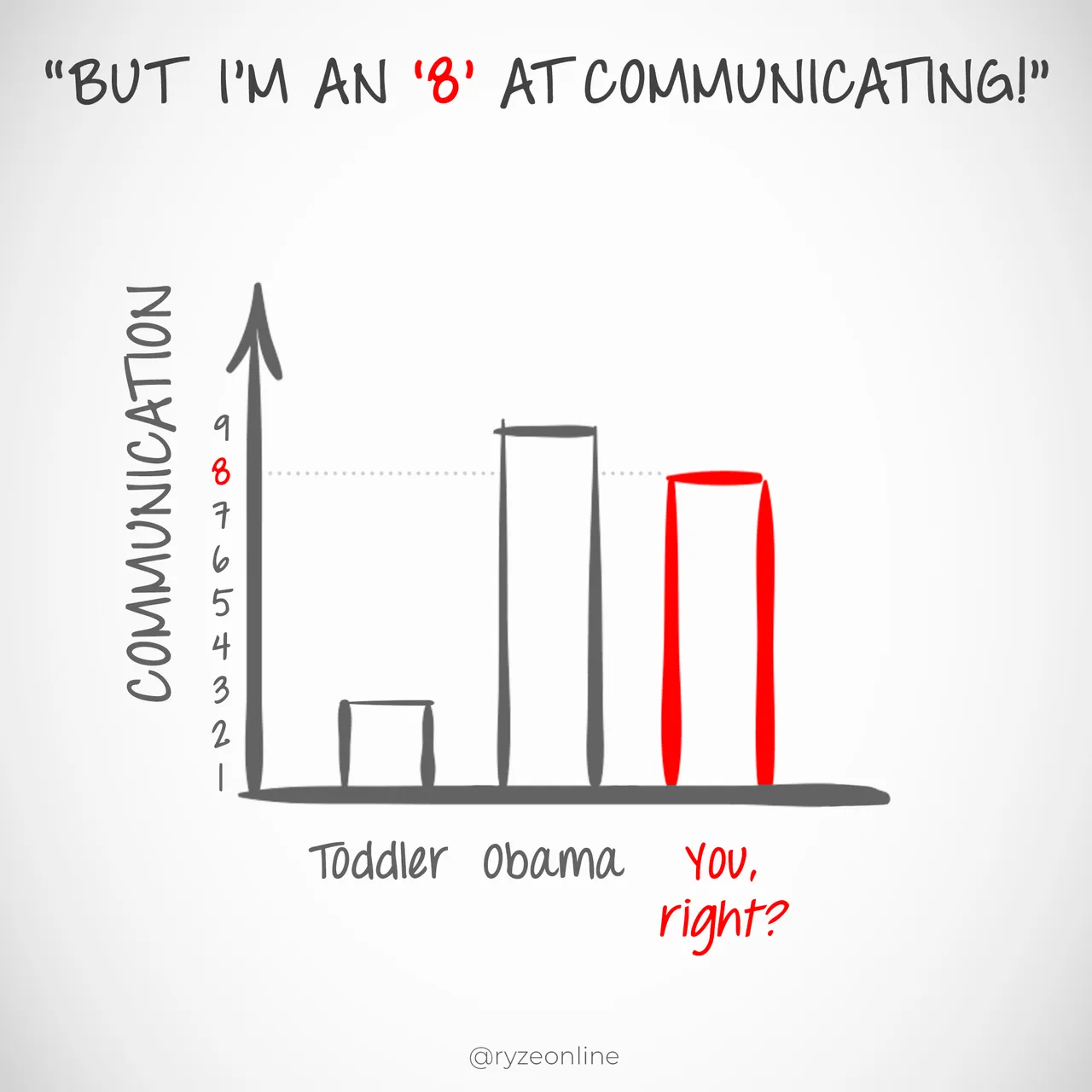
Ultimately, I realized that the more my heart and mind are free of issues, the more effective my communication becomes. My lessons recently hadn’t talked much about the connection between a pure heart and pure writing, but my fight with Cassie was an aha moment for me.
I’d rather communication be tennis-practice over a battle.
Or maybe I’d like it to be a beautiful dance between two caring souls. And I had the chance to make sure that happened with Cass, but I let my crunchy mood and my sh*tty beliefs take me down a bad road. And now I have to fix it.
I’ve tried apologizing. Taking my words back. Showering her with praise and gifts. Nothing works, probably because she can tell I’m trying to ‘get’ forgiveness from her, just like I started this whole thing out trying to ‘get’ upvotes. My communication is still selfish. (Sigh.)
As it stands, Cassie’s still not talking to me, and after the way I communicated, that’s totally understandable.
So let me know what you guys think. What would you do in my situation? Have you ever done something similar? How’s your communication these days? I’d love to hear it in the comments. And even if you don’t feel like writing, if sharing my honest tale here was of any value, please consider upvoting, it means a lot to me.
Much love,
~Emma’
“Stunning writing, Emma. Truly.
It’s got personality, authenticity, emotion, impact, suspense, engaging questions, a persuasive ‘big idea’, positive value, hints of controversy, self-awareness, an eye-opening perspective, and tons of soul.”
“You really like it?”
“I really do. I’m so impressed, my darling.”
“Thanks, I poured a lot into it. I believe it’s my best piece to date, I believe it’s gonna help me, Cassie, and everyone on Hive. I’m proud of it, but I’m not chasing upvotes. They’ll come if they’re meant to, and if not, I’ll just go back to the drawing board and improve my communication. I feel really good about this piece, no matter what external reactions I get.
“Brilliant. You’ve somehow learned the biggest lesson about getting upvotes ever, and without me explaining it at all.”
“Yay! Go me! Was it the ‘communication should be a dance’ part?”
“Actually no, although that is a fantastic point.”
“Then what did I do? What was the biggest lesson ever?”
“To put soul into what you write. To approach it with pride and humility. To bring positive mood & belief to your writing. And I don’t mean a little bit of belief occasionally, while you worry, doubt, and live in anxiety the rest of the time. I mean true, consistent, solid belief.
You’ve got to believe in what you write. You’ve got to believe it’s valuable. That it’s compelling. Persuasive. That it resonates with its target audience. That it’s share-worthy, engaging. You have to believe it in your bones. And that kind of belief only comes through practice. Practice, practice, practice.
Michael Jordan didn’t randomly believe he was a baller, he practiced over & over. As he practiced he came to believe that he could sink baskets & outperform others. Lady Gaga didn’t randomly believe her songs would click. She practiced and failed and got closer, until eventually she began to believe ‘I’ve got this. This song is the one, they’re gonna love it.’ And if it didn’t succeed like she thought, she’d do it all again. Her practice improved her confidence, until she believed it in her bones. Until she believed her content was going to succeed, and no external criticism would change that belief. This is the secret ingredient of truly great communicators. Self-belief. Belief in their work. Belief in their audience. Belief in humanity. This is the secret no writing book teaches you, and it’s the peak of what I’ve taught over the last few days.
You can’t be ‘playing small' with what you share. You’re on earth to express your truth the best way you know how. To speak out on topics that matter. And you’re meant to practice doing so in the most loving ways you know.
Ultimately, as long as you’re satisfied with your self-expression, that’s what matters. Tell the truth with purpose, with love, as clearly and accurately as you can. Have pure beliefs, a pure heart, and pure intentions when you write. Practice so that you become masterful at these things. Recognize how people are using language around you, and improve yourself. Learn to communicate in ways that foster prosperity in others, not ways that diminish them. Learn to persuade responsibly. Learn to create healthy environments for communication that resonate with your audience, and then, once that’s all done... soak up the amazing results.
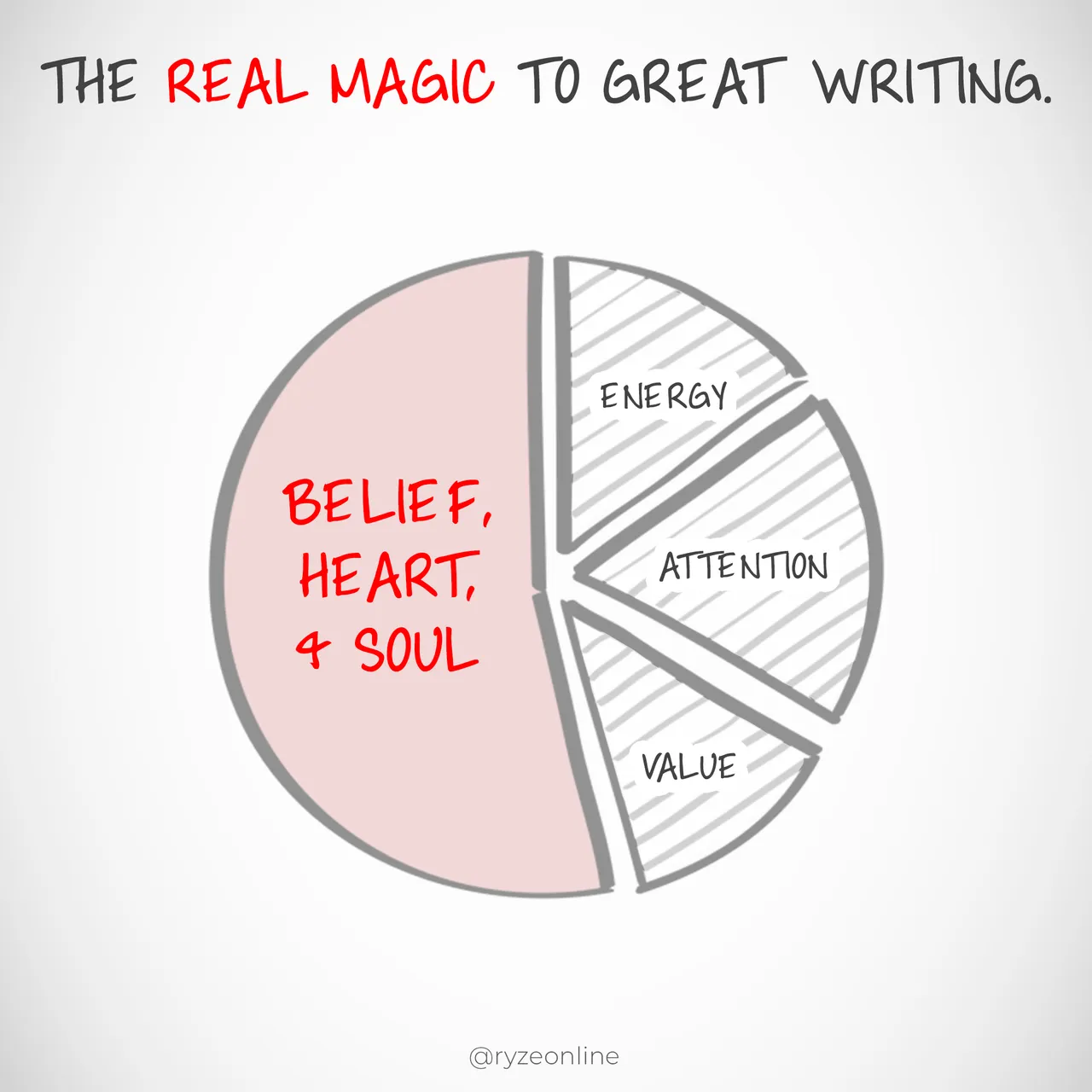
Commit to mastering communication and watch your life (& upvotes) soar.”
Thank you all so much for reading!
I believe the more people who read this, the better content our world will have. So if you're tired of boring writing, awkward conversations, and way too many misunderstandings, please share this with your networks on various socials.
P.S. Special thanks to Envato.com and FlatIcon.com. (Entire post is available here: https://jryze.me/write )
